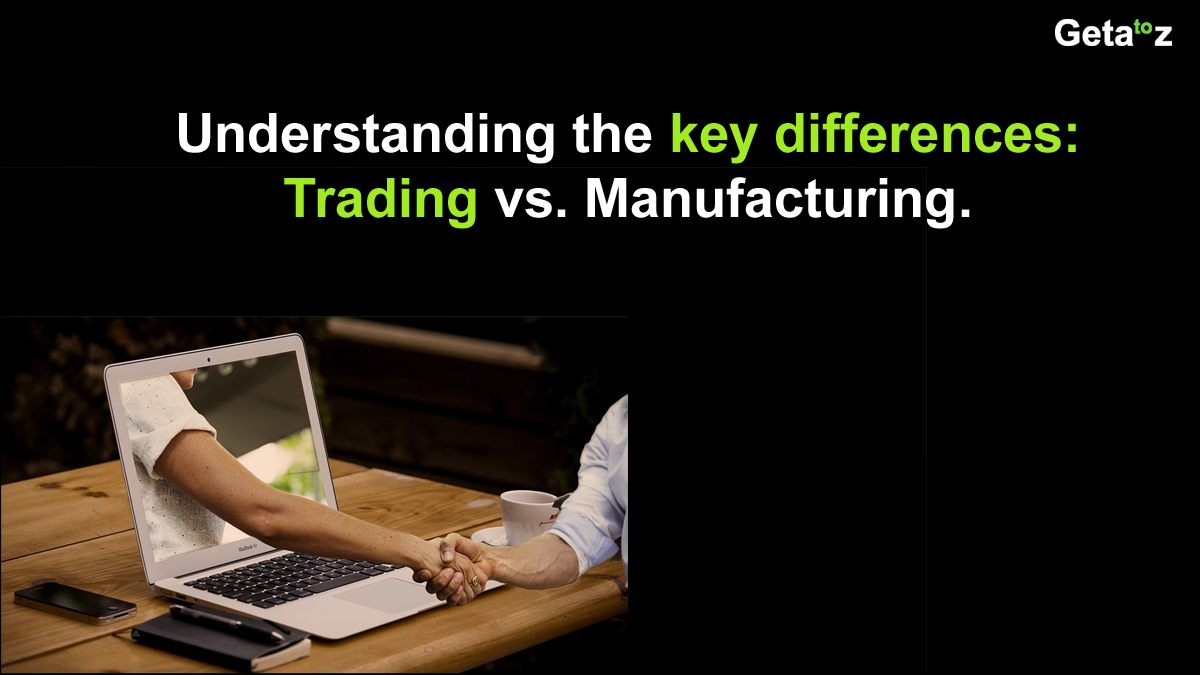Trading vs Manufacturing
Updated: November 29, 2024

Trading Companies:
Trading companies typically serve as intermediaries in the production and distribution of goods and services. They purchase, sell, and deliver goods to retailers in different regions, and even sell directly to consumers looking to buy wholesale.
These companies are primarily involved in wholesale trade, sourcing products from manufacturers and managing the final sale through their distribution channels. They are often located near high manufacturing areas or have offices in such regions.
If you’ve purchased anything from global eCommerce marketplaces, you’ve likely interacted with a trading company. In addition to maintaining online storefronts on digital platforms, many trading companies also have physical locations. These locations often retail products from multiple manufacturers but may also serve as licensed distributors for specific manufacturers within a particular geographic area.
Things to be considered while starting a trading company:
- Deciding on location: You need to decide if you want to do most of your activities on the internet. However, no business can be entirely digital. You need to secure a physical office location, furnishings, and equipment if you decide not to go digital.
- Product focus: You should first determine the products you would like to trade and then decide if you would be working as a distributor of several products or focus on distributing a single product.
- Product sourcing and licenses: Next, you have to decide where to source your products from after making your decision. This is something important to keep in mind as trading companies must have a good relationship with the manufacturers from whom they are going to purchase the products.
- Distribution network: A trading company must have an established distribution network using which they will be able to move whatever goods they have in stock.
- Delivery and shipping solutions: Consider the way you want to deliver and ship the products. Air or sea freight and last-mile delivery solutions are some of the options that can be used for delivery and shipping of products. Logistics options are provided by B2B portal sites which you can use.
- Labor and payroll: Trading companies do not necessarily need more employees as as they can do their job even with just three to five employees. However, it also depends on the size of business you want to build.
Manufacturing Business:
- Make to stock: The most common model of production is Make to stock in which manufacturing goods based on forecasts about supply performance is involved. This model can be challenging to implement, as there is always a risk that demand may get lower than expected.
- Make to order: Make to order model can be less risky for manufacturers as goods will only be produced based on existing demand. However, it can result in creating pressure on the company if demand overtake production capacity.
- Make to assemble: This model is a hybrid between the first two models. A ready supply of raw materials or components is maintained for production but the final goods are only assembled when an order is received.
Things to be considered while starting a manufacturing company:
- Licenses and approvals: You need to obtain licenses and approvals depending on the type of the industry and the product you want to produce. You must ensure your products are safe and meet industry specific standards and obtain certifications to establish this.
- Infrastructure and equipment: Outsourcing most of the manufacturing process and equipment leasing where possible is considered by many companies due to the potentially high cost.
- Production input: A lot of decisions about how you want to produce your goods including where to source your raw materials from, your preferred production processes, and more should be made.
- Patents and trademarks: It is crucial to explore how a patent application can protect you if you are doing many things in ways that have not been done before. Trademarks for your product name, package design, and colors also need to be secured.
- Labor and payroll: Hiring skilled employees is very important for manufacturing companies. However, your access to workers with the necessary skills and competitive wages will be determined by the location of your factory.
- Distribution network: The arrangements for getting your products out of the factory need to be considered finally. Buyers ranging from wholesalers to even final consumers are needed for what you manufacture.
Trading versus Manufacturing Business:
Although both trading and manufacturing companies are involved in producing and distributing tangible goods, they differ in several ways. Trading companies may require lower capital investment compared to manufacturing companies, though this can vary based on the size of the manufacturing company and whether certain production processes are outsourced.
Despite these differences, trading and manufacturing companies have a complementary relationship. While manufacturing companies produce the goods, trading companies handle the shipping and distribution to consumers across global markets.